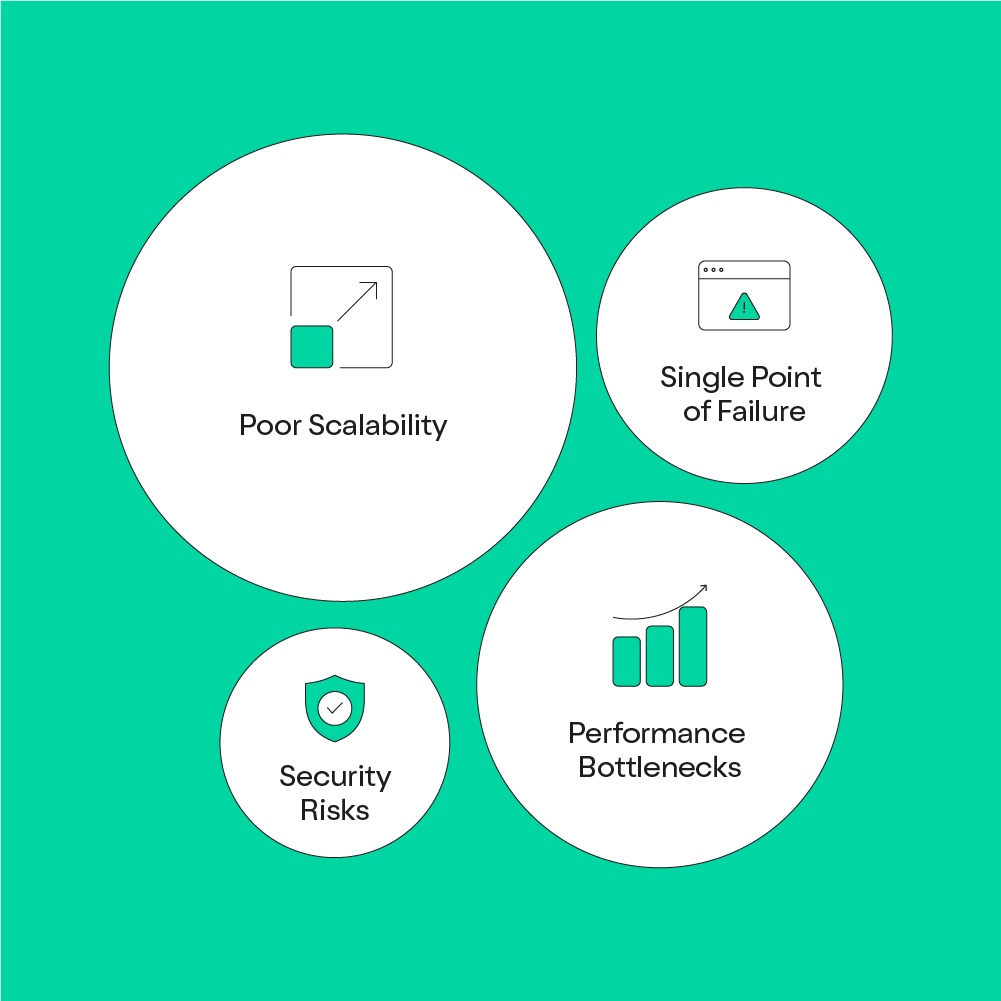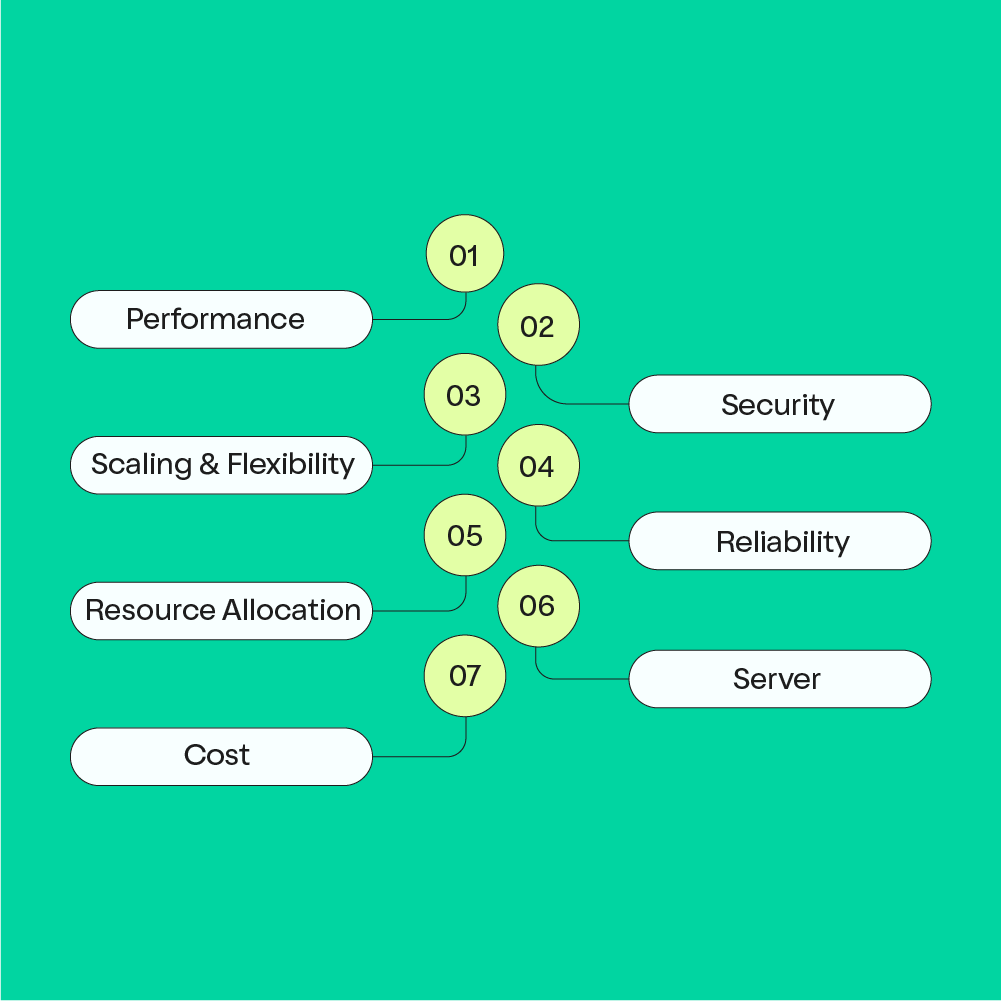There is one silent secret behind all the fast, safe and reliable websites that is often ignored: the kind of web hosting you get. And it is not only a technical point; this is how a website can perform well when it is under pressure and how it can fail as soon as traffic surges.
On the internet, you will find all the options that toss around labels such as web hosting, cloud hosting, shared, VPS, and dedicated. Most people don't know how these hosting differ from each other.
Worry not! We have come up with a detailed guide on the difference between web hosting and cloud hosting. Before the end, you will not just be sure how the two are different, but you will know which one would best suit your situation and why.
We shall remove the noise and establish the truth in web hosting vs cloud hosting.
Overview of Web Hosting
Web hosting is a service whereby individuals and companies can have their websites available online. Web hosting is basically a lease of the physical server in which all files, pictures and databases of your website are stored.
Conventional web hosting is more or less like a personal computer that accommodates several websites simultaneously. These servers are based in the data centers, and they are administered by hosting companies. You can end up sharing server resources with hundreds of other websites, depending on the plan of your choice, or you might have a dedicated server by yourself.
That is why the comparison of shared web hosting vs cloud hosting is rather common when the restrictions of the traditional hosting begin to show when a website requires more than a simple set of features.
Types of Traditional Web Hosting

The traditional web hosting is of various options, which provide different amounts of performance, control and cost. It has basic shared hosting plans, VPS and dedicated servers, all tailored to the needs of various websites. Although they are still popular amongst several users, traditional hosting is not always as scalable and flexible as modern business solutions. This is why more individuals have resorted to cloud hosting solutions.
First of all, to compare and contrast web hosting solutions such as traditional web hosting vs cloud hosting, one should be aware of the key types of web hosting:
Shared Hosting
- The most frequently used entry level.
- Several websites may have the same server resources, including bandwidth, storage and CPU power.
- Inexpensive and have low security, particularly in cases where a single location has too many resources.
Virtual Private Server (VPS) Hosting
- An upgrade of shared hosting
- It is still deployed on the same physical server, which is then divided with the help of virtualization.
- Has more control and stability than shared hosting, but not as much as cloud hosting scalability.
Dedicated Hosting
- A physical server that is devoted wholly to a single user.
- Offers high-level performance, security and customisation.
- It is more costly and must involve technical skills to work effectively.
These options bring out the stark difference between cloud hosting vs VPS hosting, or cloud hosting vs dedicated hosting, as we will see later in detail.
Web Hosting Advantages
Web hosting is a commonly used option due to its ease and cost-effectiveness. It can be effortlessly installed and is user-friendly to beginners, and is extensively offered by hundreds of providers. Web hosting provides an inexpensive approach to getting online when compared to large sites, blogs, start-ups or businesses with limited traffic, that do not require highly technical expertise. Additionally, its simple design makes it a dependable point of entry to individuals and businesses still on the first steps of the digital experience.
In spite of the drawbacks, web hosting has been used over the decades due to its simplicity and low costs. Some key advantages include:
Affordability: Shared hosting is among the cheapest methods of putting a site online.
Ease of Use: Ideal for simple sites, blogs, or portfolios.
Broad Availability: Web hosting packages are provided by virtually all the hosting companies in the area of traditional web hosting services.
Web Hosting Disadvantages

Though web hosting is cheap and user-friendly, it has several limitations. Shared resources might experience performance issues during high traffic. In addition to this, they might have security threats that are more than when using more advanced hosting. Scalability is also not as much, i.e., to support increasing demands of the website, one may need to upgrade to another plan or server.
Nonetheless, it has some disadvantages that frequently force developing websites to move to cloud hosting:
Poor Scalability: It is hard to deal with traffic bursts. Resource addition involves a plan upgrade or a change of server.
Performance Bottlenecks: In shared hosting, noisy neighbors can cause your site to slack.
Security Risks: Shared environments are less secure than the web hosting and cloud hosting security standards.
Single Point of Failure: Once the server goes down, the websites that are hosted on it all shut down.
These are the drawbacks of web hosting services, and that is why companies that consider expansion tend to initiate the research on the benefits of cloud hosting and make the transition.
Overview of Cloud Hosting
Unlike conventional web hosting, which depends on a single physical server, cloud hosting is based on a network of interconnected virtual servers that are used to host websites and applications. This decentralized methodology will be such that your site is not bound to a single machine. Rather, it takes resources such as storage, processing power and bandwidth in a cluster of servers collaborating in real-time.
This is the significant difference between web hosting and cloud hosting: in the latter, failure of a single server results in the instantaneous transfer of the load to another server. It would mean that your site is online with minimum interruption and therefore much more reliable and available.
Cloud Hosting: How It Works
Cloud hosting can be thought of as a resource pool that is distributed to many data centers. When you subscribe to a cloud hosting company, your website is installed on a virtual machine, which gets connected to this pool.
The main aspects of cloud hosting architecture are:
Load Balancing: Traffic is evenly distributed among the servers to avoid the loading of any one server.
Virtualization Resources: This creates a separation and dynamic allocation of resources so that you can get what you want without impacting the other users.
On-Demand Scaling: You can increase storage, bandwidth, or CPU capacity on demand without having to upgrade hardware.
This makes cloud hosting suitable for companies that require the capability to scale, performance and flexibility that cannot be provided in traditional hosting.
Cloud Hosting Advantages

There is much more to cloud hosting than ensuring that your site is online. The following are the best reasons why the switch is being made by more businesses:
High Performance
Cloud hosting uses a combination of servers, which adds faster load times, as well as a seamless traffic burst.
The comparison of web hosting vs cloud hosting performance goes in favor of the cloud hosting.
Scalability
Cloud hosting scalability means that resources can be scaled up or down within minutes. It works particularly well with businesses that have seasonal peaks in traffic or with e-commerce stores.
Reliability
Cloud hosting reliability does not have a point of failure as compared to traditional hosting. We have built-in cloud hosting reliability for your website, as the risks of downtime are lower.
Security Enhancements
Most offerings come with advanced security measures such as firewalls, DDoS protection, and up-to-date monitoring. This compares web hosting with cloud hosting security, which is favorable to the cloud.
Cost Flexibility
Many cloud providers have pay-as-you-go pricing instead of charging when you have not used the resources, so it can be more cost-effective to host when you need it.
Pros and Cons of Cloud Hosting
Cloud hosting is a new way of managing websites that has distinct benefits and some drawbacks. On the other hand, it is flexible, scalable and more reliable than the traditional types of hosting. But similar to any technology, it has some weaknesses, i.e., increased cost in some instances and a learning curve for beginners.
Knowledge of these advantages and disadvantages can enable companies to make decisions on whether to use cloud hosting or not.
Pros:
- Excellent performance and availability.
- Near-infinite scalability.
- Better security alternatives than shared hosting.
- Adjustable price models (pay as you go).
Cons:
- It could be more costly than shared hosting, where the site is small.
- Technical skills are required to set up and administer.
The cost may change depending on the usage, and thus some businesses may have a hard time budgeting.
Cloud Hosting Role in the Modern Market
Cloud hosting has become so widespread. Businesses of all sizes are now able to enjoy the advantages of cloud hosting by the many smaller hosting companies offering simplified cloud hosting packages.
Be it in a shared hosting vs cloud hosting or cloud hosting vs dedicated hosting, the cloud has almost always provided better flexibility, performance, and long-term value.
Comparison of Web Hosting vs Cloud Hosting: Major Differences

Comparing a cloud server and a web server, one should realize that they have the same basic purpose, delivering websites and applications over the internet, but they are different in terms of organization and performance. A web server typically runs on one machine, whereas a cloud server runs on a virtualized environment running a number of servers.
This distinction has an effect on scalability, performance and reliability, and each solution is appropriate to varied business requirements.
Performance
Web Hosting: Shared hosting condition entails sharing server facilities among many websites. This may delay load time and performance in the event that one site has massive traffic. VPS and dedicated hosting are better in performance, yet they have the capacity of only one server.
Cloud Hosting: Takes advantage of the various interconnected servers, which allows, load balancing as well as improved response times. The peaks of the traffic are effectively handled and do not disrupt the user experience.
Key point: Cloud housing is more consistent in terms of better web hosting compared with cloud hosting.
Security
Web Hosting: The shared sites are more susceptible to insecurity. Security has manual updates and settings even with dedicated servers.
Cloud Hosting: if we compare web hosting vs cloud hosting security, we see that it is a service that has the following advanced security features: firewalls, automated backups, DDoS protection, and real-time monitoring. In the case of the businesses that are sensitive regarding their data, web hosting vs cloud hosting security compares evidently place cloud computing at an advantage.
Cloud computing, winner: Simple cloud computing is more secure and reliable.
Scaling & Flexibility
Web Hosting: It is cumbersome and destructive as scaling resources will need an upgrade to a more advanced plan or changing to a different server.
Cloud Hosting: Provides scaling of resources on demand. Cloud hosting can be scaled up (CPU, storage, bandwidth) on demand, which is perfect when you need more capacity than a previous project and your business or website is experiencing high traffic.
Winner: Cloud hosting, due to unrivalled flexibility.
Reliability
Web Hosting: When one server malfunctions, it would take all the websites down. Even dedicated servers are prone to downtime during the maintenance or the failure of hardware.
Cloud Hosting: Single point of failure is removed in the distributed architecture. In case there is a failure of one server, there is another server that automatically takes its place making cloud hosting reliable.
Cloud hosting: More uptime and better performance.
Resource Allocation
Web Hosting: Fixed Resource Allocation This is where your site is restricted by your server. Traffic spikes may lead to a crash or slowdowns.
Cloud Hosting: performs the dynamic allocation of resources, which belong to a group of servers, which are optimal in work and efficiency. That is why it is also suggested to use cloud hosting vs VPS hosting in case of the growing websites.
Winner: Cloud hosting, to be smarter in managing the resources.
Server
Web Hosting: Single server configuration of limited redundancy.
Cloud Hosting: A virtualized and redundant network that is distributed across a number of servers and data centers. The architecture is favored with enhancement of the load management, cloud hosting and enhancement of reliability.
Winner: Cloud hosting, to have a powerful and future-proof infrastructure.
Cost
Web Hosting: It is cheaper at the beginning, which is appropriate when new or small websites are required. Shared hosting is very cost-effective.
Cloud Hosting: It is usually more expensive than shared hosting, but the pay-as-you-use pricing means that the resources are only billed as needed. It is more cost-effective in the long term for expanding websites since it is scalable and less prone to downtimes.
Conclusion: Small and less traffic web hosting, cloud web hosting business, which needs to grow and be reliable and fast.
Cloud Hosting Comparison with Other Hosting Types
In comparison to cloud hosting, among other types of hosting, differences usually come in terms of management and delivery of resources. Conventional hosting solutions such as shared, VPS or dedicated server hosting typically use a single physical machine. That’s why constraining the performance, scalability, and reliability.
Cloud hosting, on the other hand, spreads the load across several servers, thus guaranteeing enhanced uptime and flexibility. Although shared hosting could be the best option to maintain because of its cheap price, dedicated servers could be suitable for large companies with constant requirements.
However, cloud hosting would be the optimal solution that provides flexibility to any business organization of any size. Its scalability as needed, automation of traffic surges, and enhanced security make it a prospective solution, unlike more conservative hosting solutions.
Shared Web Hosting vs. Cloud Hosting
Shared Hosting: Inexpensive and friendly to beginners; however, the performance is compromised as there is a shared server resource. The risk of security is greater, and difficulty in scaling.
Cloud Hosting: It offers dynamic facilities, superior reliability, and strong security. It has an easy time managing traffic bursts.
Hence, in the case of expanding businesses, there is a preference for cloud hosting over shared hosting in terms of performance and flexibility.
Cloud Hosting vs VPS Hosting
VPS Hosting: It provides dedicated resources on the virtual server, which is better than the shared hosting. Nonetheless, it remains restricted to one physical server.
Cloud Hosting: It uses many servers to allocate resources and eliminate points of failure. Cloud hosting is better than VPS hosting in terms of scalability, reliability and uptime.
Cloud Hosting Vs Dedicated Hosting
Dedicated Hosting: It provides full control over a single server, high performance and high security. It is, however, costly and does not have the scalability in real time.
Cloud Hosting: This is a mix of the benefits of the various servers, as well as on-demand scaling, cloud hosting reliability and cost-effective resource allocation.
Therefore, Dedicated servers are excellent for large or dedicated hosting websites, but cloud hosting vs dedicated hosting is, in most cases, more beneficial to businesses in need of flexibility and uptime.
Cloud Server vs Web Server
A web server is typically just a physical server that is running websites (traditional web hosting), whereas a cloud server is virtual, scalable and a part of a network of servers.
Traditional Web server matrix at times when the traffic is high. On the other hand, Cloud server offers excellent load balancing, an increase in uptime and automatic failure over a single web server.
Websouls: The Right Choice of Cloud Hosting
Looking for the best cloud hosting providers?
Consider Websouls, with years of excellence and expertise, we rule over the hosting market.
Selecting the appropriate host might be the difference between success and failure, and Websouls has proven itself to be a reputable company that can provide quality and efficient cloud hosting at affordable rates. Having a high emphasis on scalability, security, and uptime, WebSouls is confident that companies, regardless of their size, will receive the resources they require. We guarantee that you will have a smooth hosting experience without downtime or performance decline. In addition to this, we offer cheap packages, easy to set up, and provide timely customer service. These features have made us one of the best cloud hosting providers in Pakistan.
Why WebSouls Stands Out:
- Performance and uptime on sites of any size.
- The resources can easily handle traffic bursts (scaling of cloud hosting).
- Secure ways of keeping your data safe.
- Easy-to-use cloud hosting solutions and customer service.
- Considered among the leading cloud hosting providers in Pakistan.
In conclusion: Web Hosting vs Cloud Hosting
A decision on the appropriate hosting is vital to the success of your website. Conventional web hosting is also cost-effective and acceptable for small sites, but has restrictions with regard to performance, scalability, and security.
Cloud hosting is better, however, in terms of performance, reliability, security and scalability. Using resources provided by several servers, it can easily cope with traffic bursts and also, maintain low downtime. To compare cloud hosting and shared hosting, cloud hosting and VPS hosting or cloud hosting and dedicated hosting, it is obvious cloud offers more benefits to websites intending to grow.
Although in web hosting vs cloud hosting cost, web hosting might be cheaper in the short term, cloud hosting will provide you with long-term advantages. However, before purchasing a hosting plan, make sure your provider offers reliability, flexibility, and affordability.
Happy hosting!






